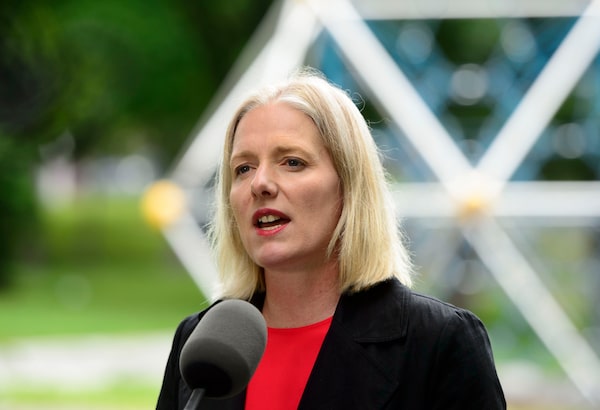
Environment Minister Catherine McKenna says Albertans will face a federal carbon price on Jan. 1, after the move by Premier Jason Kenney to kill the system imposed by the previous NDP government.Sean Kilpatrick/The Canadian Press
The Ontario Court of Appeal has handed the federal Liberal government a major victory in its climate-change battle with conservative premiers, upholding Ottawa’s carbon price as falling within its powers to address matters of national concern under the “peace, order and good government” clause.
In a 4-1 decision, the court rejected Ontario’s claim that the federal government had exceeded its jurisdiction by applying a tax on greenhouse gas emissions. It said the carbon price is not technically a tax because it is meant to achieve a regulatory result and the revenues are returned to jurisdictions in which they are collected.
Writing for the majority, Mr. Justice George Strathy said greenhouse gases are accumulating in the atmosphere at an “alarming rate,” and cited the 2015 Paris treaty description of climate change as “an urgent and potentially irreversible threat to human societies and the planet." Global warming is clearly a matter of national concern that the federal government can address under its constitutionally delegated powers, he said.
“The need for a collective approach to a matter of national concern, and the risk of non-participation by one or more provinces, permits Canada to adopt minimum national standards to reduce GHG emissions,” Justice Strathy wrote. He said there was uncontested evidence before the court that climate change causes or exacerbates impacts such as floods, droughts and famine and loss of endangered species.
The Liberal government imposed the levy on four provinces that did not have their own pricing systems: Ontario, New Brunswick, Saskatchewan and Manitoba. Environment Minister Catherine McKenna says Albertans will face a federal carbon price on Jan. 1, after the move by Premier Jason Kenney to kill the system imposed by the previous NDP government.
Saskatchewan’s top court also upheld the federal legislation in May. The provincial government appealed; the Supreme Court of Canada will hear it on Dec. 5.
Ontario Premier Doug Ford indicated the province would appeal Friday’s decision, and is intervening in Saskatchewan’s appeal to the Supreme Court. Mr. Kenney has also launched a legal challenge to the federal plan to impose its carbon levy in his province.
The Ontario Court of Appeal decision is a major victory for Prime Minister Justin Trudeau, who is heading into a fall election campaign in which climate change will likely be a major issue.
The Liberal government will defend its carbon tax, which kicked in on April 1 at $20 a tonne – or 4.5 cents a litre on gasoline – and will rise to $50 a tonne in 2022. Ms. McKenna said recently the Liberals do not plan to increase the rate after 2022, but will rely on additional measures to meet Canada’s target of reducing greenhouse gas emissions by 30 per cent below 2005 levels by 2030.
The Court of Appeal ruling is “good news for every Canadian who believes that climate action is urgent and that smart solutions can make the planet safer and our economy stronger, too,” the minister said in a release.
“It is unfortunate that Conservative politicians including Doug Ford and Jason Kenney, supported by [federal Conservative Party Leader] Andrew Scheer, continue to waste taxpayers’ dollars fighting climate action in court rather than taking real action to fight climate change,” she said.
Mr. Scheer has vowed to scrap the carbon tax if elected this fall, but he would maintain a more modest regulatory cost on large industrial emitters.
Mr. Ford and Ontario Environment Minister Jeff Yurek vowed to continue the battle. The provincial government has launched anti-carbon-tax ads and a regulation forcing gas stations to post notices about its cost.
“We know, as do the people of this province, that the federal government’s carbon tax is making life more expensive for Ontarians and is putting jobs and businesses at risk," the Premier said in a release.
Also on Friday, Environment and Climate Change Canada released final regulations that cover industrial emitters under the federal carbon-pricing plan. The government has tightened the rules with regard to natural-gas-fired electricity, and now plans to impose the tax on all emissions from such plants built after 2021 rather than just a portion of the GHGs, as had been proposed. That change will make electricity from gas-fired plants relatively more expensive compared with renewable power sources.
The government also released details on its proposed Clean Fuel Standard, which would force fuel suppliers to reduce emissions by including biofuels, purchasing credits from electric vehicle manufacturers, or taking steps to improve the energy efficiency of their own refining and distribution operations.